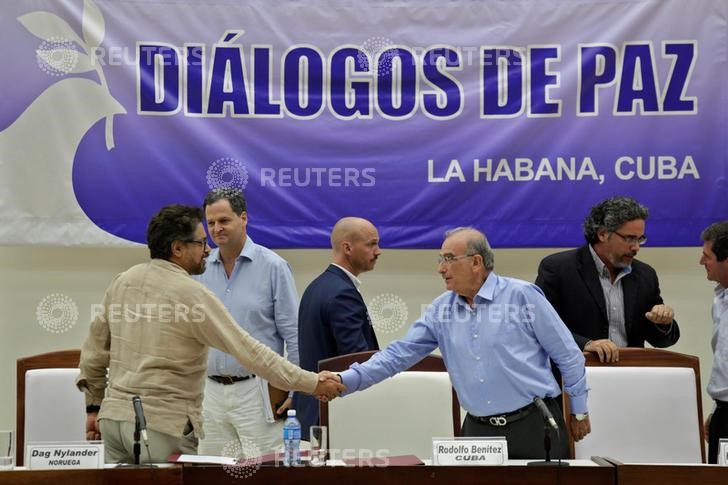By Dion Rabouin
(Reuters) – Colombia’s historic peace agreement with FARC rebels, to be unveiled on Wednesday after almost four years of negotiations, is not likely to give the country’s struggling economy an immediate boost, investors said, as sluggish commodities prices remain the most pressing issue. Any benefit to the agreement, set to be unveiled late on Wednesday, is already reflected in the country’s markets and economy, investors said, after the government and rebels reached a ceasefire deal in June, setting the stage for a final pact. The agreement will end more than 50 years of combat between the Revolutionary Armed Forces of Colombia (FARC) and the country’s government. Colombian voters still need to approve the agreement in a referendum expected to take place in the next couple of months. “It’s good news in the abstract, but we have to see whether the referendum will be approved … and there are other issues in terms of fiscal reform that need to be addressed by the government,” said Jim Barrineau, co-head of emerging markets debt at Schroders Investment Management. Wednesday’s accord would see FARC rebels reintegrated into civil society and given the opportunity to participate in politics.
“While there is little doubt that the deal is a net positive for the economy, the more optimistic estimates of its impact on the economy in the near term are unlikely to be borne out,” said Adam Collins, Latin America economist at Capital Economics in a research note. “The security situation in Colombia has been steadily improving for more than a decade,” he said. “As such, most of the economic benefits of peace in terms of increased investment and tourism have already been felt.” Colombia’s economy grew 4.4 percent in 2014 before slowing to 3.1 percent GDP growth in 2015, pressured by declining oil revenues.
How Colombia navigates its fiscal deficit and rising inflation is now more pressing than the long-term prospect of peace in the country, investors said.
Assuming the referendum on the deal passes, Colombian President Juan Manuel Santos is expected to seek approval for a package of tax increases aimed at offsetting falling oil revenues, Eurasia Group said in a research note. Investors also cautioned that the agreement could be an economic hindrance as re-integrating rebels could add to Colombia’s budget deficit, which might hamper reform efforts and cause a downgrade in the country’s credit rating. The Colombian peso The price of oil (Reporting by Dion Rabouin; Editing by Bill Rigby)
Colombia peace pact won’t boost economy in near term – investors

By Dion Rabouin
















